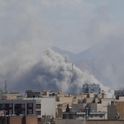What is the first news event you can recall?
In 1970, Canada’s prime minister Pierre Trudeau invoked the War Measures Act for the first time in Canadian history during peacetime. I remember the dark days of waiting to find out what had happened to Quebec’s deputy premier Pierre Laporte and British diplomat James Cross, who were both kidnapped by members of the Front de libération du Québec (FLQ). Cross was released; Laporte was murdered.
If you could spend a day in one city or place at one moment in history, what would that be?
In 1881, in Memramcook, New Brunswick, the first Acadian Convention established 15th August as Acadian National Day. It marked the first step towards the Acadians’ rediscovery of their sense of self and place after Britain expelled this entire community from the eastern seaboard of Canada in the mid-18th century, burning their lands and crops; many died at sea. The Doucet family is one of many who were able to return to their homeland. The Acadian story inspires me.
What is your favourite quotation?
“The way we are living,/timorous or bold,/will have been our life.” Seamus Heaney.
If you were given £1m to spend on other people, what would you spend it on and why?
Education. It is the door to a better future. It made all the difference in my life, and I’ve seen it change the lives of so many others. I’ve also seen so, so many lives blighted by not going to school.
How do you manage to keep your equilibrium in a warzone?
I try to never lose hope. Being there with old colleagues, as well as dear friends who are from the warzone, also makes a huge difference; it’s never just a story.
What’s the biggest challenge you face reporting from Kyiv?
Not having any clear idea of what lies ahead, or how long Russia’s destructive invasion will last. I still find it hard to get my head around the fact it’s happening at all. It’s heart-wrenching to see such a beautiful land shredded, so many lives shattered.
Can journalism change the events it reports on?
Journalism doesn’t always change events. But I’ve seen it change minds.
Which of your ancestors or relatives are you most proud of?
I sometimes wonder if I am related to Jacques Doucet. He is regarded as one of the finest French designers during the period known as the Belle Époque, often described as a time of optimism and regional peace and prosperity. He’s known for the “Doucet dress.” It seems that, like me, his favourite colour was blue.
On air, what has been your most unexpected moment?
Years ago, just before I went on air to present a TV bulletin, a producer informed me I would be interviewing a new guest, remotely. It was a boyfriend who disappeared years earlier. I had lots of questions but didn’t ask them on air.
What have you changed your mind about?
I used to like staying up late. Now I’ve seen the value and virtue in being an early riser.
What would people be surprised to know about you?
I am a curler (or was) and come from a family of curlers. It’s a sport beloved by Scots but seems to bemuse everyone else in Britain. “Reading the ice” is a great skill; so is throwing and sweeping the rocks. I represented my province in the Canada Winter Games in 1975.
What is the last piece of music, play, novel or film that brought you to tears?
My colleague Steve Rosenberg, now the BBC’s Russia editor, is also a master pianist. In the midst of the Ukraine crisis, he composed a piece called “Isolation,” saying it was how he felt right now. I listened to it as I looked out on Kyiv’s eerily deserted streets.
What do you most regret?
My life’s goal is to live a life without regret. So I would most regret having a regret.
Lyse Doucet is the BBC’s chief international correspondent












